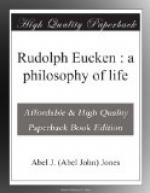The Christian ideal of life must be a more joyous one, of greater spiritual power, and the idea of redemption must not stop short at redemption from evil, but must progress to a restoration to free and self-determining activity. Since an absolute religion is based on the spiritual life, the form in which it is clothed must not be too rigid—life cannot be bound within a rigid creed. With its form modified in this way, Eucken considers that Christianity may well be the Absolute Religion, and that not only we can be, but we must be Christians if life is to have for us the highest meaning and value.
CHAPTER IX
CONCLUSION: CRITICISM AND APPRECIATION
We have attempted to enunciate the special problem with which Eucken deals, and to follow him in his masterly criticisms of the solutions that have been offered, in his further search for the reality in life, in his arguments and statement of the philosophy of the spiritual life, and finally in his profound and able investigation into the eternal truth that is to be found in religion. In doing so, we have only been able in a few cases to suggest points of criticism, and sometimes to emphasise the special merits of the work. It was necessary to choose between making a critical examination of a few points, and setting forth in outline his philosophy as a whole. It was felt that it would be more profitable for the average reader if the latter course were adopted. Thousands who have heard the name of Eucken and have read frequent references to him are asking, “What has Eucken really to say?” and we have attempted to give a systematic, if brief, answer to the question. Having done this it will be well to mention some of the main points of criticism that have been made, and to call attention again to some of the remarkable aspects of the contributions he has made to philosophy and religion.
Several critics complain of the obscurity of his writings, of his loose use of terms, and of his tendency to use freely such indefinite and abstruse terms as “The Whole,” “The All,” &c., and of his tendency to repeat himself. Of course, if he is guilty of these faults, and he certainly is to some extent, they are merely faults of style, and do not necessarily affect the truth or otherwise of his opinions. In the matter of clarity he is very variable; occasional sentences are brilliantly clear, others present considerable difficulty to the practised student. His more popular works, however, are much clearer and easier to understand than the two standard treatises on The Truth of Religion and Life’s Basis and Life’s Ideal. His tendency to repetition is by no means an unmixed evil, for even when he appears to be repeating himself, he is very often in reality expressing new shades of meaning, which help towards the better understanding of the first statements.




